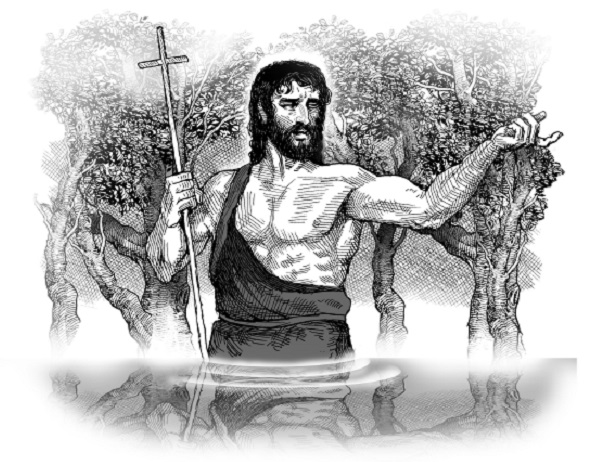
Quite serendipitously, I came across a poem by Thomas Merton about John the Baptist.
I surmised that such a poem could only be written by someone like Merton, a Trappist monk, who lived a life of silence, abstention, prayer and work — and, therefore, was in a position to understand the character of that legendary biblical solitary.
The Gospels portray John as austere, who wore a shirt of camel skin and ate nothing except locusts and wild honey, and pursued a spiritual mission with one mind, confessing his nothingness in the presence of God, whom alone he desired to grow in.
The Gospel of John describes John the Baptist as a witness, a witness to the light. And the way he testified to the light was through humility, by denying that he was the Messiah or a prophet, and identifying himself, quoting Isaiah, as no more than “the voice of one crying in the desert, ‘Make straight the way of the Lord.’”
And when asked why he was nonetheless baptizing people, he answered, “I baptize with water; but there is one among you whom you do not recognize, the one who is coming after me, whose sandal strap I am not worthy to untie.’” He meant Jesus.
Well, how does Merton describe John in the poem, “St. John Baptist”?
The poem has three parts. The first sets the historical setting, the time of John’s appearance — in the fifteenth year of the reign of Tiberius Caesar, in the Near East, which Caesar ruled through his governors or tetrarchs, and where “The Word of God was made.” Into this setting, “from the desert, John came down to Jordan.”
Merton writes that John’s “prophetic messages / Were worded in a code the scribes were not prepared to understand,” because the scribes and teachers of the Law of Moses had studied the coming of the Messiah so much that they did not recognize it happening before their very eyes. Merton addresses the scribes and pharisees:
You proud and strong,
You confident in judgment and in understanding,
You who have weighed and measured every sin
And have so clearly analyzed the prophecies
As to be blinded on the day of their fulfillment:
Your might shall crumble and fall down before Him like a wall…
Instead of believing, they kept asking who the Lamb was that John kept talking about, who the Savior was, “Whose sandal-latchet / This furious Precursor is afraid to loose?”
In the second part, John tells the reader about his experience in the desert, where he underwent purification and gained freedom from the pride and pleasures of the world.
“I went into the desert to receive / The keys of my deliverance / From image and from concept and from desire.”
Love had made him tough as nails —“It is because my love, as strong as steel, is armed against all hate / That those who hate their own lives fear me like a sabre.”
As a consequence of John’s transformation, the desert itself underwent a transformation.
And the dry wilderness
Suddenly dressed in meadows,
All garlanded with an embroidery of flowering orchards,
Sang with a virgin’s voice,
Descending to her wedding in these waters
With the Prince of Life
The third part is a prayer to John, whom Merton calls the first Cistercian and the greatest Trappist, whose life “laid down for us the form and pattern
of / Our love for Christ.”
St. John, strong Baptist,
Angel before the face of the Messiah
Desert-dweller, knowing the solitudes that lie
Beyond anxiety and doubt,
Eagle whose flight is higher than our atmosphere
Of hesitation and surmise…
The prayer asks John to obtain for us “his solitude and death” (contemplation and sacrifice) and, more than that, his “great command of graces,
Making our poor hands also fountains full of life and wonder,
Spending, in endless rivers, to the universe,
Christ, in secret, and His Father, and His sanctifying Spirit.
That is how the poem ends — a plea for John’s intercession for the endless river of grace to turn our emptiness into “fountains full of life and wonder.”
John’s power arose from his life of poverty and solitude, which, according to Merton, was likewise the life of a Trappist monk, and which, in another poem, “The Quickening of St. John the Baptist,” Merton amplifies in these words:
Night is our diocese and silence is our ministry
Poverty our charity and helplessness our tongue-tied sermon.